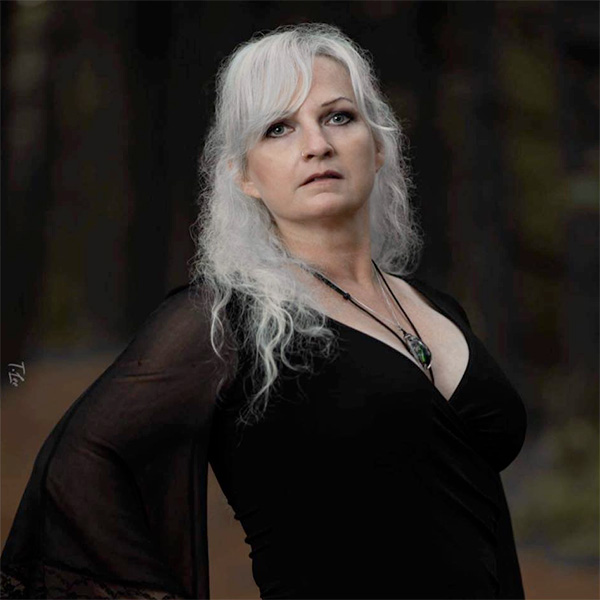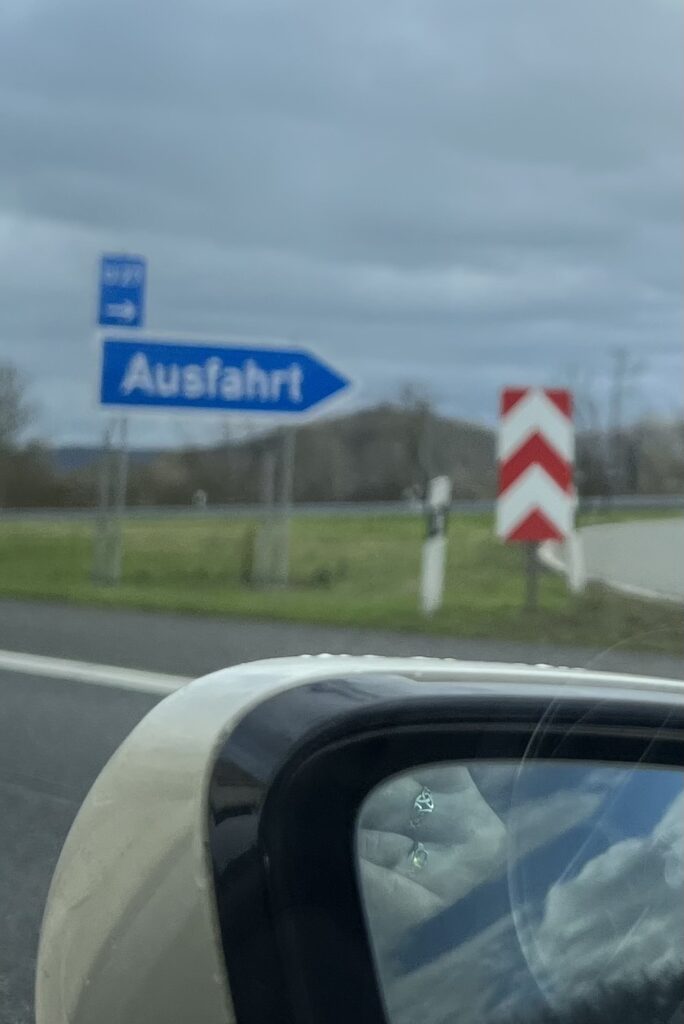Today we will talk about Granny Women who are definitely for sure not witches, make sophomoric jokes in multiple languages, and hear some good old-fashioned Appalachian ghost stories, all with the owner of a haunted AirBNB.
Listen now:
About Today’s Guest: Ronda Caudill

Ronda Caudill, PhD, had a very religious upbringing. The strict denial of the supernatural conflicted with her lived experience when, at just 5 years old, she began seeing ghosts. At 15, she shed the mantle of organized religion to become a practicing pagan and witch. At 19, she followed in the footsteps of her paternal grandmother (a table tipper in the 1920’s) and her aunt (an Appalachian Granny Woman), and began offering psychic readings to family.
Ronda has been a professional psychic medium for 18 years and began tea leaf reading (tasseography) at the age of 19. Ronda has also practiced mirror scrying, table tipping, using dowsing rods, pendulums and spirit boards for over thirty years. She’s also a Reiki master and teacher. She is the lead psychic for The Southern Research Society, or SRS Paranormal. She recently purchased the Nickerson-Snead House in Glade Spring, VA (the skinny part between Tennessee and West Virginia), and is in the process of opening a haunted AirBNB therein!
A true pioneer in Pagan education
Ronda is also an author, who uses her talents to educate people about witchcraft traditions. Self-publishing her own books took on a life of its own, and she founded Full Moon Publishing LLC. In 2022, Ronda appeared on the documentary Season of the Witch, produced by Sword & Stone Entertainment and T. Lee Films. This film explores various aspects of and misconceptions around witchcraft. You can watch it on Amazon, Roku, Tubi, or walmart.com.
If you’d like to connect with Ronda, you can follow SRS Paranormal on Facebook and follow Ronda’s Facebook page @rondacaudillphd and Insta @caudillronda.
Show notes
What is Appalachian Granny Magic?
We’ve spoken about the “granny witches” of Appalachia myriad times (although the right words to describe them probably wouldn’t include terms like witch or magic). There might even be a great grandmother in Becky’s family who practiced Appalachian folk magic. Commonly, Southern Appalachian women who practiced this type of folk medicine and faith healing would staunchly declaim the term “witch,” due to its conflict with Protestant Christianity.
Early European settlers of the Appalachian Mountains depended on a local granny witch in the days when the roads were often unpassable. Or when the nearest doctor was so far that there was no chance of survival en-route. Or when the veil of poverty made going to a doctor for something as mundane as flu symptoms seem wasteful.
But did Appalachian Granny Witches practice magic?
Or did they just possess intimate knowledge of local herbs and the common sense wisdom of their ancestors?
The long tradition of folk healing in the Appalachian region can be viewed as granny witchcraft or folk magic, but these are terms most Southern Appalachians won’t use due to their negative connotations within Abrahamic religious communities. According to folklife.si.edu, “Throughout the years of the Spanish Inquisition, religious institutions used the term ‘witch’ to identify someone practicing healing and ritual outside the bounds of the Christian Church.”
Instead, Granny Women’s healing methods were seen as an extension of their strong belief in the Christian God, not as contrary to it. Psalms, Bible verses, and Christian devotions were common elements of their practices. In this context, the term “magic” may refer to the perceived extraordinary effectiveness of their remedies. Also, the deep respect these wise older women commanded in their communities. For most Appalachian Granny Women, their magic existed simply in weaving folk wisdom from generations of common sense and trial and error.
Are there still Granny Women in practice?
Highways and telecommunications have significantly reduced rural Appalachians’ reliance on a local granny witch as a first responder. Since modern medicine’s organized disbandment of as many other healing traditions as possible, traditional and indigenous healing practices in the United States are now viewed as anywhere on a spectrum of ancillary to snake oil (e.g. malicious fakes).
Granny magic is still practiced in modern day Appalachia. Yet today, most people who practice Appalachian folk magic mainly provide services as a gift for their own family, not for the whole community. The more remote the community, however, the higher the chances it will still look to the local Granny Woman before seeking a big city doctor hours away.
What is sympathy magic?
Sympathetic magic, also known as imitative magic, is a type of magic based on the principles of similarity and contagion. It operates on the belief that like produces like (meaning an effect resembles its cause), and that objects once in contact with each other continue to affect each other at a distance after contact has been severed. Even early Western medical scholars followed the belief that like cures like, which they termed the “Doctrine of Signatures.”
In magic, this concept can manifest through traditions like using effigies or objects to influence people or environments, often seen in the use of voodoo dolls, where actions performed on the doll are believed to affect the person it represents. It also includes beliefs in the influence of one object or being on another based on their former contact, a concept evident in various folk magic throughout the world.
What is root magic?
Root work, in Southern Appalachia and specifically the coastal region of North Carolina, is a spiritual and healing folk magic tradition deeply intertwined with nature, especially plants and herbs. Herbal medicine might be labelled as fringe nowadays, but around 40% of modern pharmaceuticals are derived from natural sources like roots and herbs, often developed based on traditional knowledge and herbal remedies. For example, aspirin originated from the 3,500 year-old practice of using willow bark for pain relief and inflammation. Similarly, the antimalarial drug artemisinin was developed from sweet wormwood. Root workers and granny women knew just what local plants could soothe colic, ease flu symptoms, or heal a bad burn. Their reasoning for why these remedies worked, however, may not have aligned with modern medical concepts.
The term “root magic” is mainly associated with Hoodoo. This religion, founded by enslaved African people in the American South, combines old world African spiritualities with indigenous botanical knowledge. It often incorporates Christian elements in spells.
Is granny magic root work?
Appalachian granny magic similarly used intimate knowledge of native plants to treat ailments and provide medical care in isolated, underserved, poor communities. Yet the average granny magic practitioner wouldn’t typically use the term “root magic” for her practice any more than she’d call it witchcraft. Both folk healing practices contain a deep respect for nature and a belief in the healing and spiritual power of the natural world.
Want more info on granny witchcraft and Appalachian folk magic? Don’t miss our interview with H. Byron Ballard, senior priestess and Village Witch of Asheville, North Carolina! Then, come along as we explore the similar yet distinct practice of Ozark folk magic with author Brandon Weston.
What are Ronda’s tips on how to shield yourself during an investigation?
Are ghosts are intruding on your day-to-day life because of paranormal investigating? These are Ronda’s tips on how to take charge.
- Meditate in advance to put oneself in a safe space,
- work hard at having complete faith in your safety,
- envision a bubble of protection around yourself,
- draw representative boundaries,
- say aloud that the entities cannot attach to you or follow you home in any way,
- carry snowflake obsidian, or pretty much any other black crystal as a protective charm.
Kingsport, TN, Ghost Hunting
Ronda has investigated many haunted places near Kingsport, Becky’s hometown, including:
- The Chester Inn in Jonesborough, TN,
- The Tipton-Haynes Historic Site in Johnson City, TN,
- The Old Deery Inn in Blountville, TN, and
- Rocky Mount museum in Piney Flats,TN, of dead sheep fame.
She also mentioned the following paranormal Appalachian (and other) locations:
- The Hinsdale House in Hinsdale, New York,
- Rockwood Paranormal,
- Rarotonga in the Cook Islands,
- Ghost Hunt Weekends with Tennessee Wraithchasers.
Listen to more Jonesborough ghost stories:
The Haunted AirBNB
Ronda now owns the incredibly haunted 1835 Nickerson-Snead house which is build around a 1700s cabin by Francis Kincannon. It was once a Fort, then a civil war hospital and morgue. Now it houses the headquarters of SRS Paranormal. People see the spirit of Betsy Snead wandering the house, calling her “the lady in blue.”
As of March 15th, 2024, it is now a haunted Airbnb! You can check it out at thenickersonsneedhouse.com. And it just so happens that Becky and Diana will be some of the first guests to stay the Nickerson-Snead house in April 2024. Check updates on Patreon to catch us there live!
She’s also planning to rent out her Airbnb at the Nickerson-Snead house for private paranormal investigations led by Tennessee Wraith chasers on two weekends a year. Because she doesn’t live there. She’d never ghost hunt where she lives. Unlike us. Oops.

Was there an Appalachian Granny Witch among your ancestors?
Homespun Haints is currently seeking fellow mountain people from Appalachia with true personal ghost stories! Do you have a yarn you’d like to share, or could you deepen our knowledge of granny witchcraft? Please click this link to submit your story, and we’ll be in touch soon. Have a spooky day!
